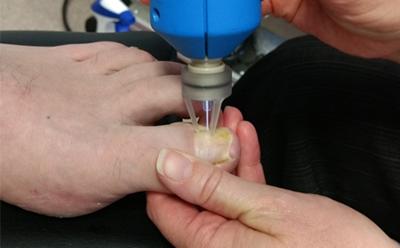New treatment for common nail infection

Researchers at the University of Southampton are trialling a new treatment for fungal nail infections, which may revolutionise the treatment of this common problem.
Many adults in the UK will develop a fungal nail infection (onychomycosis) at some point in their lives, which causes the nail to become discoloured, thickened and distorted; it usually affects the toenails.
It can be painful and current treatments are often ineffective or slow to work increasing the risk of the infection worsening and needing antibiotics. New treatments are needed, which have limited side effects and are better at clearing nail infection quickly.
Researchers from the University of Southampton’s Network for Antimicrobial Resistance and Infection Prevention (NAMRIP) together with colleagues from Solent NHS Trust are trialling a new treatment developed by BOC (A Linde Group company), which uses cold atmospheric gas plasma.
Cold Atmospheric Plasma is an ionized mix of gases that has been used in a range of medical applications from cleaning instruments to teeth whitening. Most gas plasmas have antimicrobial properties, and it is this property being tested in this study.
The plasma comes from a small device that can target the infection more precisely.
“Fungal nail infections might be seen as a purely cosmetic problem, but in people with diabetes, it can lead to very serious infections which are difficult to treat,” said Dr David Voegeli from the Faculty of Health Sciences, who is leading the study.
“We believe this new way of treating patients will be more effective in getting to the infection quickly, possibly reducing the need for antibiotics in the future.”
Professor Tim Leighton, chair of NAMRIP, said "We are facing huge challenges in antimicrobial resistance and we desperately need to find new ways of treating conditions before they need antibiotics. This is an exciting study which has great potential in treating a common condition early before antibiotic interventions are needed.”
The study aims to recruit 80 people with fungal infection in both large toenails. Following a screening test to determine eligibility, the treatment will take place within Solent’s Podiatry service at Adelaide Health Centre, Southampton.
Anyone interested in taking part in the study can find out more by calling the research team on 07919 063451 or by email at CAPTOE@solent.nhs.uk